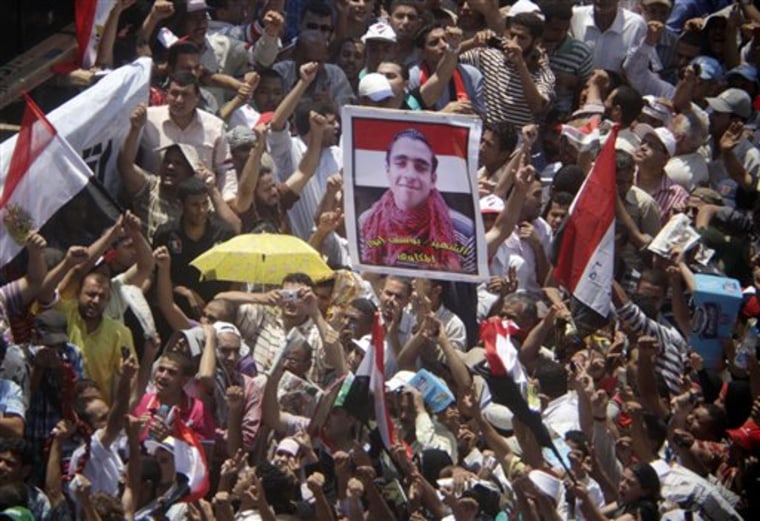Tens of thousands of Egyptians braved scorching summer heat to hold one of their biggest protests in months Friday, filling streets in Cairo and other cities to demand trials for members of Hosni Mubarak's regime and express frustration with the slow pace of change.
The exhilaration of Mubarak's ouster on Feb. 11 after 18 days of mass protests has yielded to widespread frustration that "the revolution" has stalled. The economy remains sluggish and many are confused about what comes next. Some are demanding that the country's military rulers, who took power after Mubarak, push back parliamentary elections set for September because most political factions are not ready.
Riots and protests have been escalating over what many see as the reluctance of the military rulers, who took over after Mubarak, to prosecute police and former regime officials for the killing of nearly 900 protesters during the uprising.
Many believe that although Mubarak and some much-hated figures under him are no longer in power, the pillars of his regime are still in place, including such key institutions as the judiciary, the police and civil service.
Earlier this week, seven policemen in the city of Suez were freed on bail during their trial for the killing of the protesters. Their release set off two days of rioting by angry families who accused the judiciary of corruption. Other former regime officials were acquitted from corruption charges, also raising the ire of many.
"Things are going in the wrong direction," said Lilian Wagdy, one of tens of thousands of protesters massed in Cairo's Tahrir Square, the epicenter of the anti-Mubarak uprising. She said military trials are held for civilians, while trials of security officials are postponed or they get released.
"We want to change the government and those in charge," said Ehab Mohamed Mahmoud, 36, who was checking those entering the square.
Crowds again converge on Tahrir Square
In scenes reminiscent of the 18-day uprising, civilian checkpoints were erected around Tahrir to prevent thugs from mixing in with demonstrators and potentially causing violence since there were no police or military in the area.
Banners fluttered in the wind and a large white cloth had the words "Retribution from the killers of martyrs" painted on it. Flyers read: "Real cleansing. Real government. Real trials."
With the rally, dubbed "Friday of Accountability," organizers were seeking to restore some unity in Egypt's protest movement, which has fragmented since Mubarak's fall. The Muslim Brotherhood, Egypt's most organized political group, and ultraconservative Salafis decided to join the protests Friday after staying away from others in past weeks.

The theme of justice allowed the various factions to patch over for the moment differences over the transition. Many liberal and secular activists demand that the ruling military push back the parliament elections, saying political parties can't be ready in time for September.
The Muslim Brotherhood, which is the best prepared for the race, strongly opposes any delay.
The secretive council of generals in power has so far refused any postponement, but it has also failed to set an exact date for the election or start preparations for holding it — increasing the confusion and disenchantment with what some see as the military's mismanagement of the transition.
"We want to change the government and those in charge," said Ehab Mohamed Mahmoud, 36, who was checking those entering Cairo's Tahrir Square.
"The field marshal as well. He is an integral part of the old regime," he added, referring to the military commander, Mohamed Hussein Tantawi, who heads the army council which took over from Mubarak.
Tantawi was Mubarak's defense minister for two decades.
Coastal cities see protests
Protesters also massed Friday at main squares in Suez and Alexandria, the two coastal cities which have also witnessed violent clashes between security forces and protesters during the uprising. In Alexandria, protesters carried a large cloth with the colors of the Egyptian flag; and a large banner on the seaside read: "Retribution."
In Suez, a man fired a gunshot toward the rally and was detained by organizers, said a witness, Ahmed Khafagi.
Some protesters in Tahrir are calling for a sit-in to follow the Friday rally until the protesters' demands are met. It was not clear if that would go ahead but dozens of tents were erected in the square.
In the southern city of Assiout, hundreds of protesters set up a tent camp in a main city square to prepare for a sit-in for the first time in the conservative south.
In an unusual show of anger in southern Egypt, the protesters chanted against the military council. "They removed and brought the (head of the military council) field Marshal. That means there is no change," the protesters shouted.
In the Red Sea resort of Sharm el-Sheikh, scores of protesters gathered outside the hospital where Mubarak is under arrest, demanding to see proof that he is inside. "Hosni, Get Out!" the protesters shouted, amid tight security presence.
In an attempt to defuse public anger, a prosecutor on Thursday charged 25 Mubarak-era officials with manslaughter, attempted murder and assault for their part in organizing a February attack on anti-regime protesters in which assailants on horses and camels charged into the crowds.